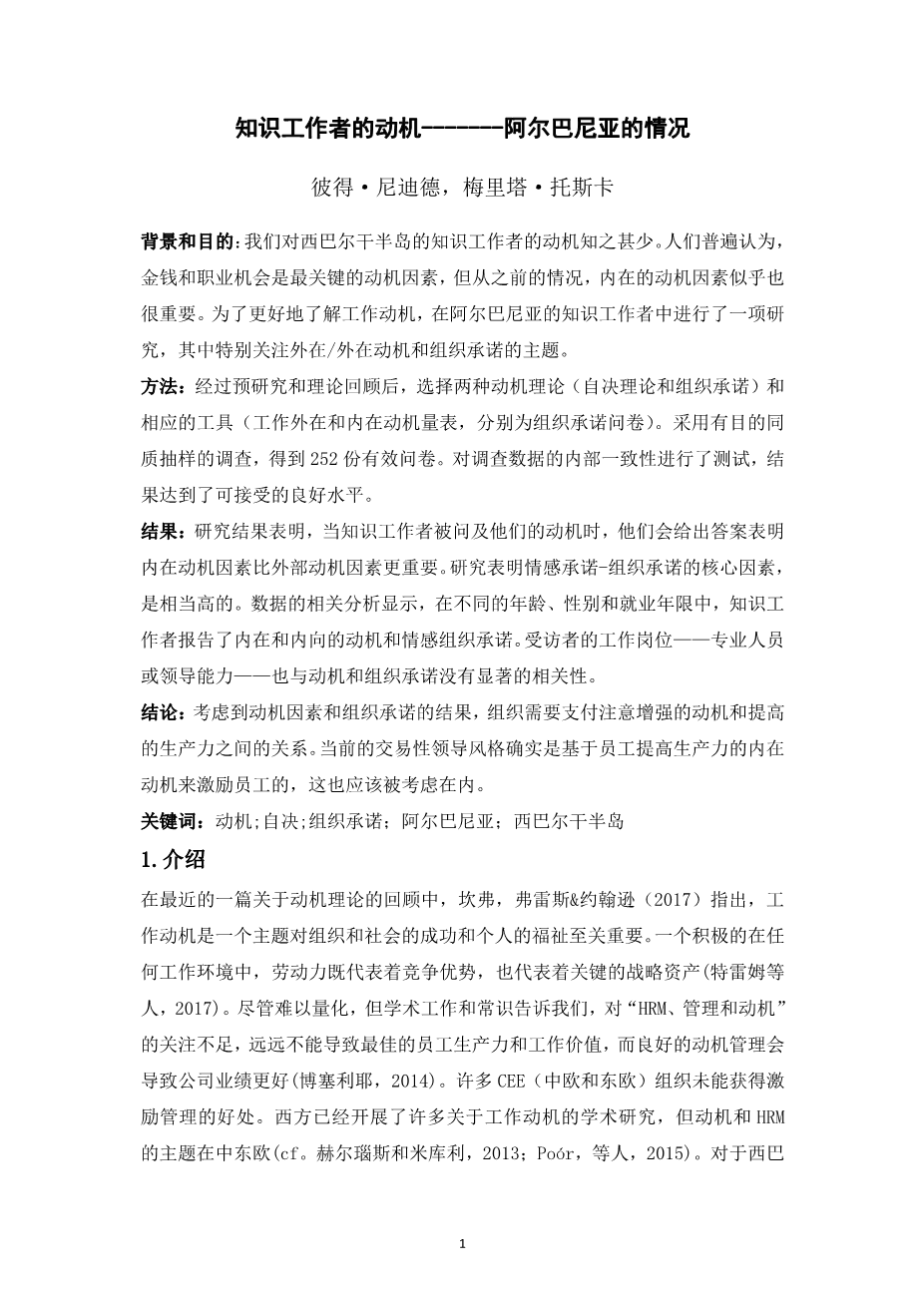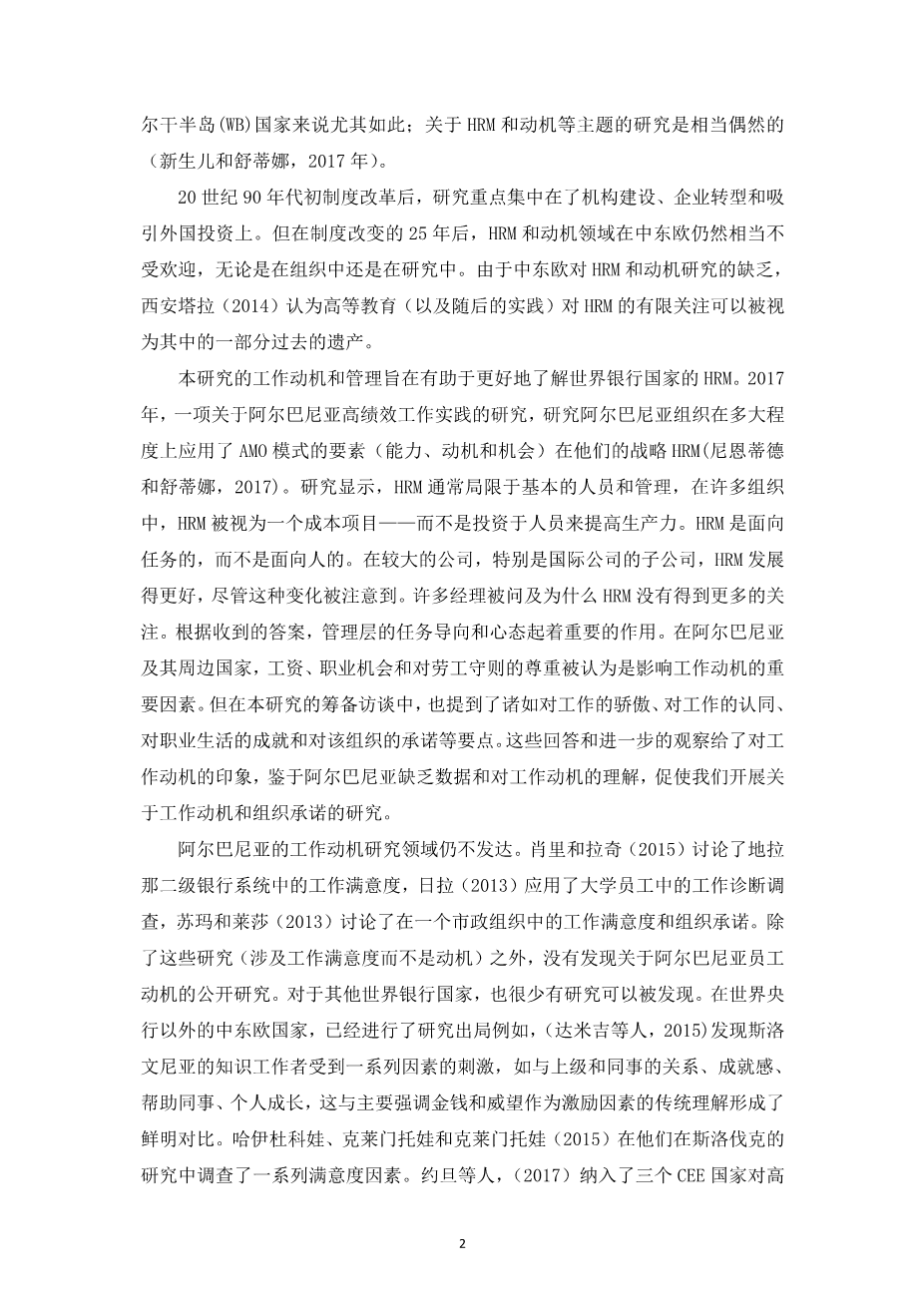Motivation of Knowledge Workers – the Case of Albania
Peter NIENTIED, Merita TOSKA
Background and Purpose: Very little is known about motivation of knowledge workers in the Western Balkans. There is a widespread belief that money and career opportunities are the most critical motivational factors, but from a pre-tudy more intrinsic motivational factors also appeared to be important. To develop a better understanding of work motivation, a study was conducted among knowledge workers in Albania, with a special interest in the themes of extrinsic / extrinsic motivation and organizational commitment.
Methodology: After a pre-study and a review of theory, two motivation theories (self-determination theory and organizational commitment) and corresponding instruments (Work Extrinsic and Intrinsic Motivation Scale, respectively Organizational Commitment Questionnaire) were selected. A survey based on purposive homogeneous sampling was applied, resulting in 252 valid questionnaires. The internal consistency of the survey data was tested and resulted in acceptable to good levels.
Results: The findings show that, when knowledge workers are asked about their motivation, they give answers
showing that intrinsic motivational factors are more important than extrinsic motivational factors. The study shows
that affective commitment - the core factor of organizational commitment - of the respondents is quite high. Correlation analysis of the data shows that across age, gender and number of years of employment, knowledge workers report intrinsic and introjected motivation and affective organizational commitment. Respondentsrsquo; work positions – professional or leadership – also do not significantly correlate with motivation and organizational commitment.
Conclusion: Given the results on motivational factors and organizational commitment, organizations need to pay
attention to the relationship between enhanced motivation and enhanced productivity. Current transactional leadership styles do stimulate employees on the basis of their intrinsic motivation to enhance their productivity, and should be considered too.
Keywords: motivation; self-determination; organizational commitment; Albania; Western Balkans
1.Introduction
In a recent review of motivation theory, Kanfer, Frese amp; Johnson (2017) state that work motivation is a topic of
crucial importance to the success of organizations and societies and the well-being of individuals. A motivated
workforce represents both a competitive advantage and a critical strategic asset in any work environment (Tremlay, et al., 2017). Although hard to quantify, academic work and common sense tell us that inadequate attention to lsquo;HRM, management and motivationrsquo;, leads to far from optimal employee productivity and work values and that good motivation management leads to better performing companies (Boselie, 2014). Many CEE (Central and Eastern European) organizations fail to harvest the benefits of motivation management. Much academic research on work motivation has been carried out in the West, but the subject of motivation, and HRM in general, is under-researched in CEE (cf. Hernaus and Mikulić, 2013; Pooacute;r, et al., 2015).This is especially true for the Western Balkan (WB) countries; studies on HRM and topics such as motivation, are rather occasional (Nientied and Shutina, 2017).
After the change of systems during the early 1990rsquo;s, attention was focused on building institutions, transforming companies and attracting foreign investments. But over 25 years after the change of system, the field of HRM and motivation is still rather out of favour in CEE, both in organizations and research. As an explanation for the scarcity of research on HRM and motivation in CEE, Zientara (2014) argued that the limited attention to HRM in higher education (and subsequently in practice) can be seen as part of
the legacy of the past.
The present study on work motivation and management aims to contribute to a better understanding of HRM in WB countries. In 2017, a study was conducted on high performance work practices in Albania, examining to what extent Albanian organizations apply elements of the AMO model (Abilities, Motivation and Opportunities) in their strategic HRM (Nientied and Shutina, 2017). The study revealed that HRM is often limited to basic personnel administration, that in many organizations HRM is viewed as a cost item - not as investing in people to enhance productivity. HRM is task-oriented, not people-oriented. In larger companies, especially subsidiaries of international companies, HRM is better developed albeit that variation
was noted. Numerous managers were asked why HRM does not receive more attention. Reflecting on the answers received, it was concluded that the task orientation and mindset of management play an important role. In Albania and its surrounding countries, pay, career opportunities and respect for the labour code are believed to be important factors that influence work motivation. But in the preparatory interviews for the present study, points such as pride of work, identification with work, achievement in professional life and commitment to the organization were also mentioned. These answers and further observations gave impressions on work motivation and, given the lack of data and understanding of work motivation in Albania, instigated us to carry out research on work motivation and organizational commitment.
The field of work motivation studies in Albania is still undeveloped. Shoray and Llaci (2015) discuss job satisfaction in the second-level bank system in Tirana, Zhilla (2013) applied the Job Diagnostic Survey among university staff, and Suma and Lesha (2013) discussed job satisfaction and organizational commitment in a municipal organi
剩余内容已隐藏,支付完成后下载完整资料
英语译文共 16 页,剩余内容已隐藏,支付完成后下载完整资料
资料编号:[602589],资料为PDF文档或Word文档,PDF文档可免费转换为Word
课题毕业论文、外文翻译、任务书、文献综述、开题报告、程序设计、图纸设计等资料可联系客服协助查找。




